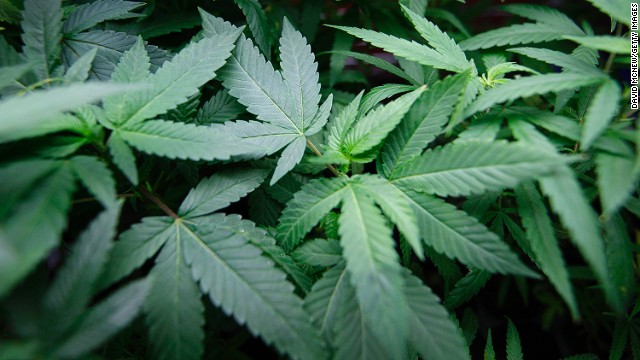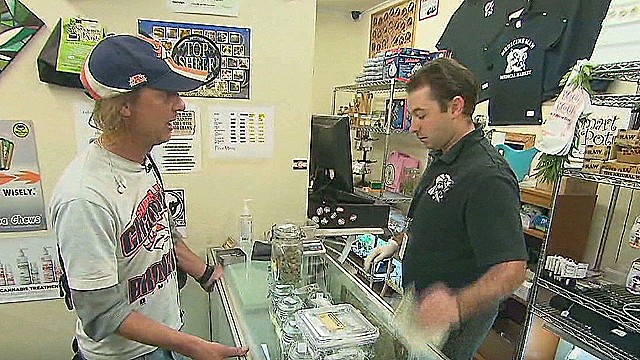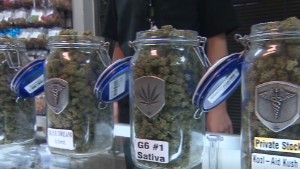Vicki
Herbal Alchemist
**In 3 days, recreational cannabis will be legal in Colorado!
10 things to know about nation's first recreational marijuana shops in Colorado
Denver (CNN) -- Colorado will begin allowing recreational marijuana sales on January 1 to anyone age 21 or over.
Residents will be able to buy marijuana like alcohol -- except the cannabis purchase is limited to an ounce, which is substantial enough to cost about $200 or more.
It's a big moment: Colorado will become the first state in the nation to open recreational pot stores and become the first place in the world where marijuana will be regulated from seed to sale. Pot, by the way, is the third most popular recreational drug in America, after alcohol and tobacco, according to the marijuana reform group NORML.
Here are 10 things to know about what will be a closely watched landmark law.


Colorado pot sales to begin in 2014
Voters wanted this. And the law is now in the Colorado constitution after 65% of voters said yes to legalizing recreational marijuana.

Colorado readies for recreational pot
Colorado wasn't the only state to OK this in November 2012. Voters in Washington also said yes, but that state won't open marijuana retail outlets until later in 2014.
Why?
There are the usual "legalize it" arguments about how pot is less dangerous than alcohol or tobacco and how legalization would save taxpayers $10 billion yearly on enforcing the prohibition.
Then there's the reality we all know: There will be a tax bonanza to public treasuries.
Retail weed will have a 25% state tax -- plus the usual state sales tax of 2.9% -- making recreational pot one of the most heavily taxed consumer products in Colorado. Some communities are adding even more taxes to the product.
The additional revenue will initially amount to $67 million a year, with $27.5 million of it designated to build schools, state tax officials say.
So why bother with separatemedical marijuana?
Because buyers of medical pot won't face the additional taxes.
Medicinal weed in Colorado still requires a physician's recommendation, and the dispensaries will be separate outlets from the recreational pot retailers.
How much recreational weed can I buy?
If you are 21 or older, you can buy up to an ounce at a licensed store, as long as you have a Colorado ID. People from outside Colorado can buy a quarter ounce.
Only a handful of stores, however, are expected to open on January 1, and Denver will be home to many of them, according to the Denver Post and the weekly Denver Westword. In fact, there are concerns that supplies will be sold out on the first day, with so few stores having passed the lengthy licensing process so far. About 160 retailers are still seeking licenses statewide.
Users can also share an ounce of cannabis with a friend as long as no money is exchanged.
Where can I light up?
You won't be allowed to smoke pot in public and, in fact, can't even smoke in the pot shop or other establishments governed by the state's Clean Indoor Air Act.
That leaves the smoking to private properties, with the owner's permission.
Communities and counties can still choose not to allow recreational marijuana stores in their local jurisdictions, and a good many towns have, such as Colorado Springs and Greeley.
Meanwhile, ski resorts are concerned about scofflaws lighting up while on the slopes, with smoke intruding on family settings.
Can I grow my own?
Yes, you can grow up to six plants in your home, but the pot patch must be enclosed and locked.
Can the underage get busted for pot?
Yes, it's illegal to possess and use marijuana if you're under 21, but the city of Denver this month decriminalized pot for people between ages 18 and 21. The city would keep the fines -- but remove the jail time -- for being caught with an ounce or less. The potential jail time had been up to a year.
Youths under age 18 could be sent to a juvenile assessment center, instead of jail. The measure ensures kids "don't have to live into adulthood with mistakes they might have made when they were 19," Councilman Albus Brooks said in a Denver Post article.
What about DUI?
A motorist in Colorado can be ticketed for impaired driving if his or her blood shows more than 5 nanograms of active THC, the active constituent of marijuana, NORML says on its website.
Some users will fall below that level three hours after consuming pot, but "some people will still be well above 5 ng," NORML says. "Do recognize that the effects of alcohol and marijuana together may be more than the sum of their parts."
Some analysts describe impairment as a guessing game, depending on the person.
"Is Colorado's marijuana DUI rule flawless? Far from it. But as the state's policymakers have come to realize, the world's first legal pot rules aren't going to be perfect. They just have to be good enough. Good enough to keep the feds away, good enough to keep marijuana stakeholders happy, good enough to keep Coloradans from worrying they've made a horrible mistake," University of Denver law professor Sam Kamin and writer Joel Warner wrote in Slate this month.
And what about the feds?
It's always been a murky relationship between the feds and those states with laws authorizing medical -- and now recreational -- marijuana. Federal law says the drug's possession, manufacture, and sale is illegal, punishable by up to life in prison, and its mass cultivation is a sensitive subject among growers, experts say.
But in August, the U.S. Justice Department said it won't challenge Colorado or other states with laws legalizing recreational marijuana. Instead, federal officials will focus on serious trafficking and keeping the drug away from children.
Does this confuse you?
It should, one legal analyst says.
"They should be confused," attorney Alan Dershowitz said. "The federal government still takes the position technically that you're violating federal law if you're complying with the state law. But the Obama administration, I believe, has recently has taken a turn on its approach to drug enforcement."
Can I giggle?
Let the jokes and puns begin -- stoned or not.
Even Colorado NORML is being cheeky about it, posting online a list of what's allowable under the new recreational pot law.
It's called "Doobie-DOs."
10 things to know about nation's first recreational marijuana shops in Colorado
Denver (CNN) -- Colorado will begin allowing recreational marijuana sales on January 1 to anyone age 21 or over.
Residents will be able to buy marijuana like alcohol -- except the cannabis purchase is limited to an ounce, which is substantial enough to cost about $200 or more.
It's a big moment: Colorado will become the first state in the nation to open recreational pot stores and become the first place in the world where marijuana will be regulated from seed to sale. Pot, by the way, is the third most popular recreational drug in America, after alcohol and tobacco, according to the marijuana reform group NORML.
Here are 10 things to know about what will be a closely watched landmark law.


Colorado pot sales to begin in 2014
Voters wanted this. And the law is now in the Colorado constitution after 65% of voters said yes to legalizing recreational marijuana.

Colorado readies for recreational pot
Colorado wasn't the only state to OK this in November 2012. Voters in Washington also said yes, but that state won't open marijuana retail outlets until later in 2014.
Why?
There are the usual "legalize it" arguments about how pot is less dangerous than alcohol or tobacco and how legalization would save taxpayers $10 billion yearly on enforcing the prohibition.
Then there's the reality we all know: There will be a tax bonanza to public treasuries.
Retail weed will have a 25% state tax -- plus the usual state sales tax of 2.9% -- making recreational pot one of the most heavily taxed consumer products in Colorado. Some communities are adding even more taxes to the product.
The additional revenue will initially amount to $67 million a year, with $27.5 million of it designated to build schools, state tax officials say.
So why bother with separatemedical marijuana?
Because buyers of medical pot won't face the additional taxes.
Medicinal weed in Colorado still requires a physician's recommendation, and the dispensaries will be separate outlets from the recreational pot retailers.
How much recreational weed can I buy?
If you are 21 or older, you can buy up to an ounce at a licensed store, as long as you have a Colorado ID. People from outside Colorado can buy a quarter ounce.
Only a handful of stores, however, are expected to open on January 1, and Denver will be home to many of them, according to the Denver Post and the weekly Denver Westword. In fact, there are concerns that supplies will be sold out on the first day, with so few stores having passed the lengthy licensing process so far. About 160 retailers are still seeking licenses statewide.
Users can also share an ounce of cannabis with a friend as long as no money is exchanged.
Where can I light up?
You won't be allowed to smoke pot in public and, in fact, can't even smoke in the pot shop or other establishments governed by the state's Clean Indoor Air Act.
That leaves the smoking to private properties, with the owner's permission.
Communities and counties can still choose not to allow recreational marijuana stores in their local jurisdictions, and a good many towns have, such as Colorado Springs and Greeley.
Meanwhile, ski resorts are concerned about scofflaws lighting up while on the slopes, with smoke intruding on family settings.
Can I grow my own?
Yes, you can grow up to six plants in your home, but the pot patch must be enclosed and locked.
Can the underage get busted for pot?
Yes, it's illegal to possess and use marijuana if you're under 21, but the city of Denver this month decriminalized pot for people between ages 18 and 21. The city would keep the fines -- but remove the jail time -- for being caught with an ounce or less. The potential jail time had been up to a year.
Youths under age 18 could be sent to a juvenile assessment center, instead of jail. The measure ensures kids "don't have to live into adulthood with mistakes they might have made when they were 19," Councilman Albus Brooks said in a Denver Post article.
What about DUI?
A motorist in Colorado can be ticketed for impaired driving if his or her blood shows more than 5 nanograms of active THC, the active constituent of marijuana, NORML says on its website.
Some users will fall below that level three hours after consuming pot, but "some people will still be well above 5 ng," NORML says. "Do recognize that the effects of alcohol and marijuana together may be more than the sum of their parts."
Some analysts describe impairment as a guessing game, depending on the person.
"Is Colorado's marijuana DUI rule flawless? Far from it. But as the state's policymakers have come to realize, the world's first legal pot rules aren't going to be perfect. They just have to be good enough. Good enough to keep the feds away, good enough to keep marijuana stakeholders happy, good enough to keep Coloradans from worrying they've made a horrible mistake," University of Denver law professor Sam Kamin and writer Joel Warner wrote in Slate this month.
And what about the feds?
It's always been a murky relationship between the feds and those states with laws authorizing medical -- and now recreational -- marijuana. Federal law says the drug's possession, manufacture, and sale is illegal, punishable by up to life in prison, and its mass cultivation is a sensitive subject among growers, experts say.
But in August, the U.S. Justice Department said it won't challenge Colorado or other states with laws legalizing recreational marijuana. Instead, federal officials will focus on serious trafficking and keeping the drug away from children.
Does this confuse you?
It should, one legal analyst says.
"They should be confused," attorney Alan Dershowitz said. "The federal government still takes the position technically that you're violating federal law if you're complying with the state law. But the Obama administration, I believe, has recently has taken a turn on its approach to drug enforcement."
Can I giggle?
Let the jokes and puns begin -- stoned or not.
Even Colorado NORML is being cheeky about it, posting online a list of what's allowable under the new recreational pot law.
It's called "Doobie-DOs."








